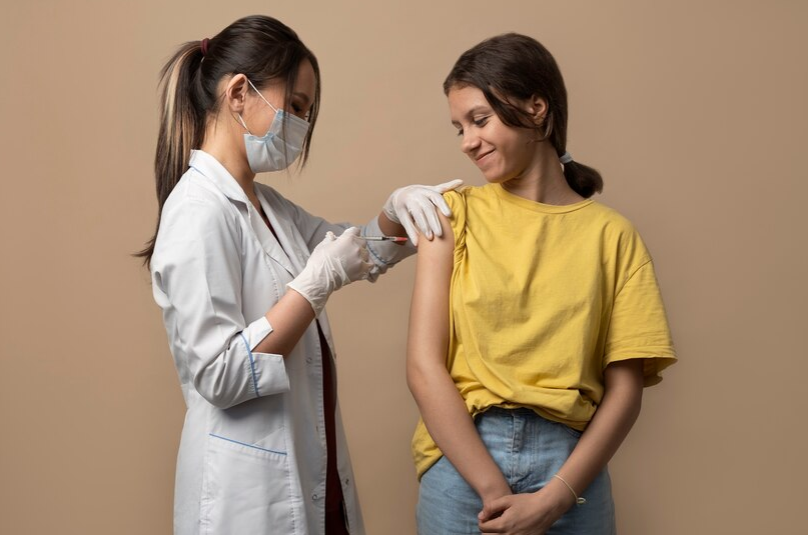
21 Jan HPV Vaccine for Cervical Cancer: A Crucial Step in Preventive Healthcare
Cervical cancer, a major health concern for women worldwide, is primarily caused by certain strains of the human papillomavirus (HPV). The HPV vaccine has emerged as a powerful tool in the prevention of cervical cancer, offering a proactive approach to women’s healthcare. Dr. Usha M Kumar, recognized as the best gynecologic oncologist in India, sheds light on the significance of the HPV vaccine in the fight against cervical cancer.
Understanding HPV and its Link to Cervical Cancer:
Human papillomavirus (HPV) is a group of related viruses that can infect genital areas, as well as the mouth and throat. While some HPV infections resolve on their own, persistent infection with high-risk HPV strains can lead to the development of cervical cancer. HPV is the most common sexually transmitted infection globally, emphasizing the need for effective preventive measures.
Dr. Usha M Kumar explains the connection between HPV and cervical cancer. “HPV infection is a significant risk factor for the development of cervical cancer. Persistent infection with high-risk HPV types, especially HPV 16 and 18, can lead to the gradual transformation of normal cervical cells into cancerous cells. Cervical cancer often develops over many years, making early detection and prevention crucial.”
The HPV Vaccine: A Powerful Preventive Measure:
The development of the HPV vaccine marked a groundbreaking advancement in the field of preventive healthcare. The vaccine aims to protect against the most common high-risk HPV strains that contribute to cervical cancer. Dr. Usha M Kumar emphasizes the importance of vaccination as a preventive strategy. “The HPV vaccine is a key tool in reducing the burden of cervical cancer. By targeting specific high-risk HPV strains, the vaccine helps the immune system recognize and combat the virus, preventing the progression to cervical cancer.”
Key aspects of the HPV vaccine include:
- Targeted Protection: The HPV vaccine primarily targets high-risk HPV strains, with Gardasil 9, the most widely used vaccine, offering protection against nine different HPV types.
- Preventing Infections and Cervical Lesions: Vaccination has proven effective in preventing infections with vaccine-targeted HPV types and related cervical lesions. This proactive approach significantly reduces the risk of cervical cancer.
- Administered in Adolescence: The HPV vaccine is typically administered during adolescence, ideally before the onset of sexual activity. Vaccination at a younger age maximizes its effectiveness, as the immune response is robust.
- Two-Dose Schedule: The vaccine is administered in two doses, with the second dose given six to twelve months after the first. The two-dose schedule enhances compliance and ensures long-term protection.
Overcoming Vaccine Hesitancy:
Despite the proven efficacy and safety of the HPV vaccine, vaccine hesitancy remains a challenge. Misinformation and misconceptions can contribute to hesitancy among parents and individuals. Dr. Usha M Kumar addresses common concerns. “It is essential to dispel myths surrounding the HPV vaccine. The vaccine undergoes rigorous testing for safety and efficacy before approval. It is a crucial tool in preventing cervical cancer and promoting women’s health.”
Common concerns and clarifications include:
- Safety: Extensive research supports the safety of the HPV vaccine. Like any vaccine, it may cause mild side effects such as pain at the injection site or fever. Severe adverse effects are extremely rare.
- Timing of Vaccination: Vaccination ideally occurs before the onset of sexual activity to maximize its effectiveness. However, individuals who have already been sexually active can still benefit from vaccination, as they may not have encountered all targeted HPV types.
- Vaccine Effectiveness: The HPV vaccine has demonstrated high efficacy in preventing infections and cervical lesions caused by vaccine-targeted HPV types. It significantly reduces the risk of cervical cancer.
- Cancer Prevention: The ultimate goal of the HPV vaccine is to prevent HPV infections and related cervical lesions, ultimately reducing the incidence of cervical cancer.
The Role of Routine Screening alongside Vaccination:
While the HPV vaccine is a powerful preventive measure, routine cervical cancer screening remains essential. Screening, typically done through Pap smears or HPV testing, enables the early detection of abnormal cervical cells, allowing for timely intervention.
Dr. Usha M Kumar highlights the complementary nature of vaccination and screening. “Vaccination and routine screening go hand in hand. The vaccine prevents infections, while screening detects early cellular changes. Together, they form a comprehensive strategy to combat cervical cancer.”
Conclusion:
The HPV vaccine stands as a beacon of hope in the realm of preventive healthcare, offering a powerful defense against cervical cancer. Dr. Usha M Kumar, recognized as the best gynecologic oncologist in India, advocates for the widespread acceptance of the HPV vaccine as a crucial step in promoting women’s health. By addressing concerns, dispelling myths, and emphasizing the vaccine’s proven efficacy, healthcare providers can contribute to increasing vaccination rates and, in turn, reducing the global burden of cervical cancer. As part of a holistic approach to women’s well-being, the HPV vaccine exemplifies the potential of preventive measures in shaping a healthier future.




Sorry, the comment form is closed at this time.